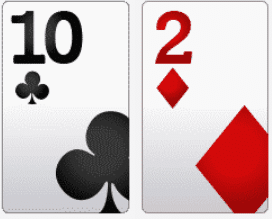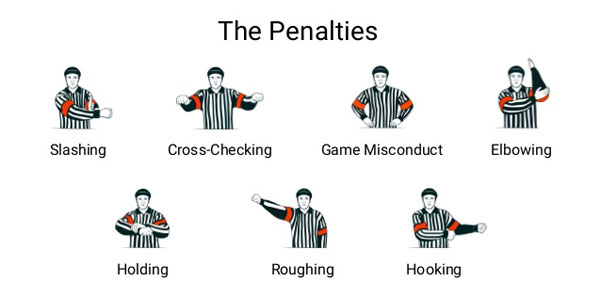Nhl Poker Rules
Every offseason, the NHL tweaks its rulebook. Some of the changes are functional and nuanced. Some of them are sweeping. This summer, thanks to the NHL and NHL Players' Association's competition committee -- and the owners' rubber stamp -- we had both. Let's chat on all the pertinent adjustments:
Q. Why is the NHL changing its video review rules?
(1) The center line was eliminated for two-line passes, and the tag up offside rule was reinstated. (2) Restrictions on the goaltender playing the puck outside a designated area were introduced. Here, we’ll look at a rather rudimentary guide on how to play online poker and win. How to play iGaming online poker: Starting out. If you’re just getting your feet wet playing poker online, you’re not alone. Many are dabbling in electronic casino games for the first time. Texas holdem is widely available online, as well as games like Omaha. Why is the NHL changing its video review rules? Did you watch the playoffs last season? Remember the blown call in Game 7 between the San Jose Sharks and the Vegas Golden Knights, when. Many of the same rules and format are shared across both game types, which form the opening 1-2 of HORSE and similar multi-variant games. Each player is dealt four hole cards, as opposed to two in Texas Hold’em, before the betting pattern and community cards follow the Texas Hold’em format identically.
Did you watch the playoffs last season?
Q. Yeah.
Remember the blown call in Game 7 between the San Jose Sharks and the Vegas Golden Knights, when Cody Eakin received a five-minute major penalty after Joe Pavelski accidentally fell to the ice and started bleeding profusely? The major penalty that led to a four-goal Sharks rally and an eventual OT win to capture the series?
Or the missed hand pass that led to the Sharks' Game 3 overtime win against St. Louis in the Western Conference final?
Or the puck that bounced off the netting, undetected, that led to a Columbus Blue Jackets goals in the Eastern Conference semifinals against Boston?
Q. Who could forget them?

OK. Now who scored the game-winning goal in Game 7 of the Stanley Cup Final?
Q. Er ... uh ... it was ... a Blue, right?
Exactly. These blown calls overshadowed the Stanley Cup playoffs, to the point where officials that were involved in the Game 7 call weren't allowed to work the next round and the NHL actually apologized to the Golden Knights.
And the last thing Gary Bettman wants is to have more discussion about officiating failures than the pageantry of the postseason. So the NHL took almost immediate action to ensure they won't happen again, or at least, will happen a lot less. Oh, and the answer is Alex Pietrangelo. Obviously.
Q. How has the NHL reacted to the Pavelski incident, from a rules perspective?
Referees who call major or match penalties, other than ones for fighting, are now required to either confirm the call or reduce it through video review. It doesn't matter if the call is obvious: Every major or match penalty, every time, gets a review.
The refs can consult with the NHL Situation Room to make sure they have access to all available video feeds, but can't consult about the play itself. The ruling will be made by the on-ice officials, after consulting each other and the available video.
Q. Can they decide not to call a penalty at all, like the Golden Knights would have argued should have happened?
No. The video review either confirms the five-minute major, or reduces it to a two-minute minor penalty. Which still would have really helped out the Golden Knights in Game 7 against the Sharks.
Q. What else now falls under expanded video review?
High sticking.
By the book, if a referee believes a player has struck an opponent's head with his stick and an injury occurs, that player is given a four-minute double-minor penalty for high sticking. Under the new rules, referees now have the option -- but not the obligation -- to review the play in order to confirm the call.
This option will allow them to check for what Bettman called 'friendly fire,' like when a player is injured by a teammate's stick or their own stick, rather than that of an opponent. Like with the major penalty calls, this is a determination made by the on-ice officials and not in consultation with the NHL Situation Room.
Nhl Poker
Q. Can they decide not to call a penalty here?
Yes. On this one, they can opt to erase the penalty if it's found the offending player did not, in fact, high stick his opponent.
Q. What did they do about that hand pass nonsense and the puck off the netting?
With more video review! Along with players going offside and goalie interference when goals are scored, the coach's challenge now includes 'Missed Game Stoppage Event in the Offensive Zone Leading to a Goal,' aka any play that results in a goal where the defending team claims that the play should have been stopped.
These include a hand pass, a high stick hitting the puck and a puck that leaves the playing surface -- but only if the infraction happened in the offensive zone, directly ahead of a goal being scored.
Q. Are there any time restrictions on these challenges?
No, nor is there a mandate that a team must maintain possession throughout the play.
The only restriction is that the puck has to remain in the offensive zone during the infraction through when the goal is scored.

For example, if there's a hand pass in the offensive zone, and then the puck leaves the zone, and then it comes back in and a goal is scored, that's not a challengeable play. Please keep this in mind for when this sequence inevitably occurs to your team this season.
Q. What if there's a penalty on the play that gets spotted during the challenge?
It doesn't matter. This challenge only covers those 'black and white' calls that are starkly defined by the rulebook, rather than subjective penalty calls by the refs. Penalties aren't in their jurisdiction, at least not yet.

'We're not prepared to go there in terms of the game right now. That would be something that wouldn't be terribly productive and would be terribly disruptive,' Bettman said.
Q. How many times can coaches challenge for offside, goalie interference or missed stoppages during a game?
As often as they'd like when a goal is scored.
Q. Is every game going to be five hours long now?
No, because there's a catch.
Rather than potentially losing a timeout in some situations, the NHL will now penalize teams that waste our time. If a team challenges a play and its challenge is unsuccessful, they'll receive a two-minute minor penalty for delay of game. If they unsuccessfully challenge a second time, they'll earn a double-minor penalty for delay of game, and then it's double-minors for each unsuccessful challenge after that.
Watching an opponent have a goal upheld and then defend four minutes of power-play time is a fairly steep price and, hence, a deterrent.
Q. What do the coaches think of the new video review rules?
'Did they officially name it 'The Sharks Rule'?' Pete DeBoer joked.
The Sharks coach echoed the sentiments we heard from his peers like Kings coach Todd McLellan, in that the pressure is now on them to wield the coach's challenge wisely.
'I think the league ... I give them credit. They want to get it right. That's the bottom line. As nice as it is to win a game, if you ask the players afterward, they want to win the right way, with the right calls. It doesn't always happen that way. Sometimes you get the benefit. Sometimes it goes against you. There is no perfectly called game,' DeBoer said. 'I think what's happened is they've pushed the onus on the coaches with the replay, in that they're penalizing us if we don't get the call right.'
Q. That's harsh.
You think that's harsh? Wait to you see defensive players sucking wind thanks to the new line change rules. You know how teams aren't permitted to change lines when they ice the puck? Now a team wouldn't be able to change lines when its goalie freezes the puck on a shot from beyond the red line, nor when a defensive skater unintentionally dislodges the net. They don't get to call a timeout, either.
Speaking of dislodging the net, do you remember David Leggio?

Q. You mean the mad genius who tipped over his own net while facing a 2-on-0 breakaway so he could face a penalty shot instead?
Alas, the NHL has joined the parade of 'Leggio Rule' legislation we've seen in other leagues. Rule 63.6 reads, 'If the goal post is deliberately displaced by a goalkeeper during the course of a 'breakaway,' a goal will be awarded to the non-offending team.' (We're not sure why 'breakaway' is in air quotes. Perhaps to cover scoring attempts by bad players, too.)
Q. Pushing the net over on a breakaway? We're really getting into myopia here now.
We haven't even mentioned the helmets.
Q. Wait, what about the helmets?
The new rule states that a player on the ice whose helmet comes off during play will be assessed a minor penalty if he doesn't exit the ice or retrieve said helmet within a reasonable period of time. (And it's seen as 'reasonable' that a player engaged in the play near the puck is allowed to complete the play before leaving the ice or regaining his helmet.) So maybe call it the 'Torey Krug Rule' after his memorable hit on Robert Thomas:
Meanwhile, a player who deliberately removes an opponent's helmet during play will be assessed a minor penalty for roughing, and for generally being rude.
Q. So that's it for the rules?
Please allow us to briefly dabble in the unparalleled thrills of faceoff location. The offensive team is now allowed to determine where a faceoff occurs following an icing, following a goalie stopping the puck from beyond the red line, following a defensive skater unintentionally dislodging the net and on the first faceoff to start a power play. This a great little well-deserved advantage for attacking teams.
Q. And thus ends the rule changes for the 2019-20 season?
Nhl Gambling Rules
Yes. But please tune in for the 2020 Stanley Cup playoffs to find out what unpredictable blown calls that cost someone a series will inspire next season's rules changes.